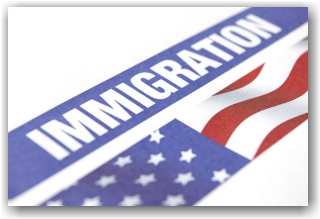 USCIS is seeking public comments on a proposed rule that would modernize and improve certain important aspects of employment-based nonimmigrant and immigrant visa programs. USCIS is also proposing regulatory amendments to better enable U.S. employers to hire and retain certain foreign workers who are beneficiaries of approved employment-based immigrant visa petitions and are waiting to become lawful permanent residents (LPRs).
USCIS is seeking public comments on a proposed rule that would modernize and improve certain important aspects of employment-based nonimmigrant and immigrant visa programs. USCIS is also proposing regulatory amendments to better enable U.S. employers to hire and retain certain foreign workers who are beneficiaries of approved employment-based immigrant visa petitions and are waiting to become lawful permanent residents (LPRs).
Read the notice of proposed rulemaking published in the Federal Register on December 31, 2015: Retention of EB-1, EB-2 and EB-3 Immigrant Workers and Program Improvements Affecting High-Skilled Nonimmigrant Workers. The public has until February 29, 2016 to comment.
Among other things, the DHS proposals to amend its regulations entail the following:
… To clarify and improve longstanding agency policies and procedures implementing sections of the American Competitiveness in the Twenty-First Century Act (AC21) and the American Competitiveness and Workforce Improvement Act (ACWIA) related to certain foreign workers, which will enhance USCIS’ consistency in adjudication.
… To better enable U.S. employers to employ and retain certain foreign workers who are beneficiaries of approved employment based immigrant visa petitions (I-140 petitions) while also providing stability and job flexibility to these workers. The proposed rule will increase the ability of such workers to further their careers by accepting promotions, making position changes with current employers, changing employers, and pursuing other employment opportunities.
… To improve job portability for certain beneficiaries of approved I-140 petitions by limiting the grounds for automatic revocation of petition approval
… To clarify when individuals may keep their priority date to use when applying for adjustment of status to lawful permanent residence, including when USCIS has revoked the approval of their approved I 140 petitions because the employer withdrew the petition or because the employer’s business shut down.
… To allow certain high-skilled individuals in the United States in E-3, H-1B, H-1B1, L-1, or O-1 nonimmigrant status to apply for one year of unrestricted employment authorization if they:
1. Are the beneficiaries of an approved I-140 petition,
2. Remain unable to adjust status due to visa unavailability, and
3. Can demonstrate that compelling circumstances exist which justify issuing an employment authorization document.
Such employment authorization may only be renewed in limited circumstances.
… To clarify various policies and procedures related to the adjudication of H-1B petitions, including, among other things, extensions of status, determining cap exemptions and counting workers under the H-1B visa cap, H-1B portability, licensure requirements, clarification concerning which H-1B nonimmigrants are exempt from the statutory cap to ensure that those who are contributing to US research and the education of Americans may remain in the USA; and protections for whistleblowers.
… To establish a one-time grace period during an authorized validity period of up to 60 days for certain high-skilled nonimmigrant workers whenever their employment ends so that they may more readily pursue new employment and an extension of their nonimmigrant status.
These proposed changes do not take effect with the publication of the notice of proposed rulemaking. Instead, they would take effect on the date indicated in the final rule when the final rule is published in the Federal Register. Here is the proposed rule. To submit comments, follow the instructions. You may submit comments, identified by DHS Docket No. USCIS-2015-0008, by one of the following methods:
Federal eRulemaking Portal: You may submit comments to USCIS by visiting http://www.regulations.gov. Follow the instructions for submitting comments. By email: You may submit comments directly to USCIS by emailing them to: USCISFRComment@dhs.gov. Please include DHS Docket No. USCIS-2015-0008 in the subject line of the message.
The Department of Labor: Modernizing the Permanent Labor Certification Program (PERM)
DOL is engaging in rule making that will consider options to modernize the PERM program to be more compatible to changes in the US workforce, to further align the program design with the objectives of the US immigration system and the needs of workers and employers, and to enhance the integrity of the labor certification process. This is not expected to be proposed until April 2016.
 US permanent residency via PERM Labor Certification is one of the few practice areas in business-related Immigration at this time that has not come under attack by the Trump administration.
US permanent residency via PERM Labor Certification is one of the few practice areas in business-related Immigration at this time that has not come under attack by the Trump administration.

